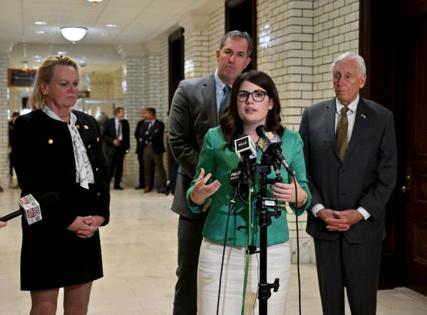Maryland Democrats hate the Big, Beautiful Bill. What can they do if it passes?
Published in Political News
WASHINGTON — President Donald Trump’s “One Big, Beautiful Bill” will soon become the new law of the land. Though some Republican lawmakers are currently withholding their support, most lawmakers expect it to eventually pass — unleashing its impact on Medicaid, food stamps, taxes and the federal deficit.
Maryland Democrats have spent months railing against the bill and its consequences, hoping to stall, change, or even kill the legislation. With its anticipated arrival on the president’s desk, they face a reckoning: What can they do about it once it passes?
“What happens if this passes is: It’s law,” Rep. Johnny Olszewski of Baltimore County told The Baltimore Sun. “And then the American people will be left with the consequences of these heartless cuts.”
“People will feel the full cruelty of this bill,” Olszewski added. “And then it’s incumbent upon myself and colleagues to communicate and share what’s been done here.”
The timeline for enacting the bill is unclear, and its provisions will have staggered implementation. So, Democrats will have some time between when Trump signs it into law and when the cuts take effect. Rep. Glenn Ivey of Prince George’s County said that he expects Democrats will use that time to determine who will be affected by the cuts.
“You’re gonna have the Medicaid impact, the Obamacare impact, the [Medicare] impact — all of those coming together,” Ivey said. “And there are dozens of other provisions in this bill.”
Roughly 17 million Americans, including over 245,000 Marylanders, are projected to lose their healthcare by 2034 should the bill become law, according to the Congressional Budget Office.
Trump and Republicans have defended the bill, arguing that it prevents the largest tax increase in American history, gives tax breaks to the middle class, and increases spending for the military and border security. They also have said that the cuts to Medicaid and SNAP will strengthen the social programs for the people most in need of the benefits.
Aside from the effects of the bill, there’s the education of what it is and could mean for constituents. A substantial amount of the cuts is built around government red tape, including more frequent eligibility checks that require Medicaid recipients to fill out additional paperwork to maintain their healthcare.
There are also new eligibility requirements for SNAP; people unaware of the new requirements could find themselves out of the program.
Rep. April McClain Delaney of Frederick County told The Sun she is talking with nonprofits, small businesses and larger corporations about the potential impact of the bill.
“I’m trying to get ahead of this in my communities by talking to them about this tsunami that is coming for rural America,” McClain Delaney said.
There’s also the potential for a special legislative session in Maryland. Ivey said Gov. Wes Moore could recall state lawmakers for a special session to address the impact of the bill on the state’s budget. Ivey added that he hasn’t spoken with the governor about the possibility recently.
McClain Delaney also broached the idea. Based on conversations with her Democratic colleagues, she predicted multiple states would hold special sessions, including Maryland.
“What’s going to happen is that states are going to now have to reallocate priorities and re-figure out what they’re going to do,” McClain Delaney said.
But even if Moore did call a special session, Maryland’s poor financial state could hamper efforts to replace the federal funding for social programs.
“The state would be extremely hard-pressed to fill the gap in any of the cuts that are coming its way,” Olszewski said, adding that he wasn’t speaking for the governor. “It would be nearly impossible for them to replace what’s being lost.”
Any practical efforts to address the fallout of the bill will go hand in hand with political messaging. While Republicans haggled with themselves over the various iterations of the bill, Democrats have been turning it into a political stinker. Polls show that a majority of Americans dislike the bill, whether because of its cuts to social programs or because of expert predictions that it will increase the deficit and debt.
Democrats will continue to use it as a partisan punching bag, hoping to turn distaste for the legislation into Democrat votes during the 2026 midterm elections.
“As people feel the cuts and the cruelty, they’re going to be even more upset with those in Congress who supported this legislation,” Olszewski said. “People don’t support it. As they learn more about it, they support it even less.”
The effects of the bill won’t be fully known until it becomes enacted law.
“We’re Americans. We’re Marylanders. We’re gonna get through it,” McClain Delaney said. “But it’s really self-inflicted wounds that we did not need to do.”
-------------
©2025 The Baltimore Sun. Visit at baltimoresun.com. Distributed by Tribune Content Agency, LLC.

























































Comments